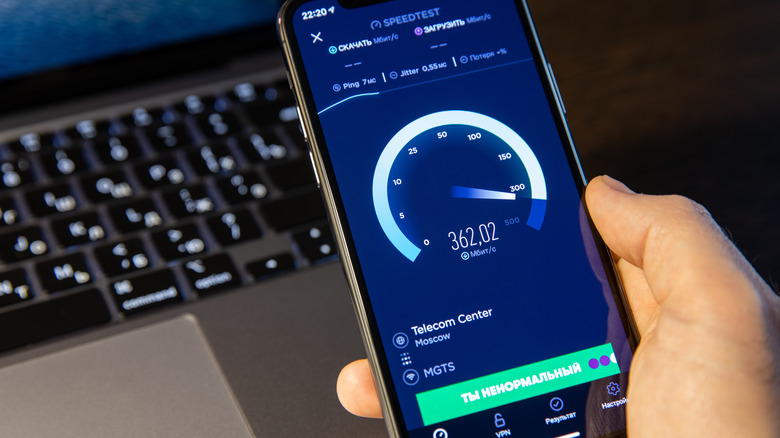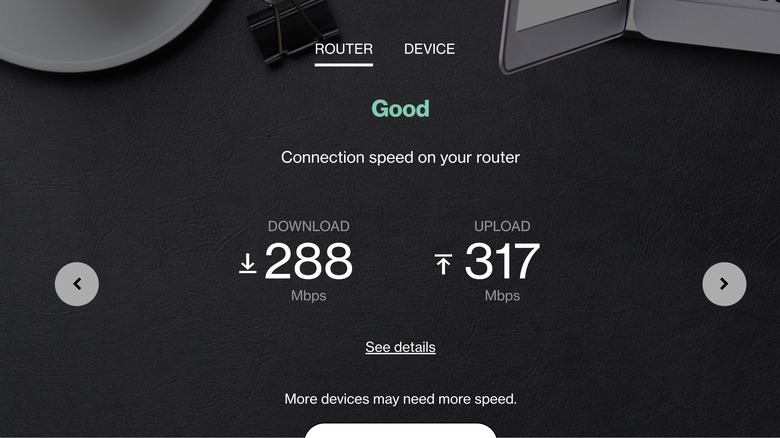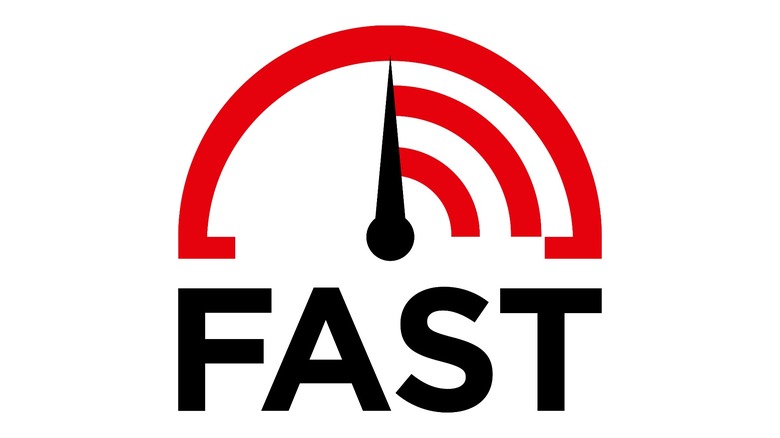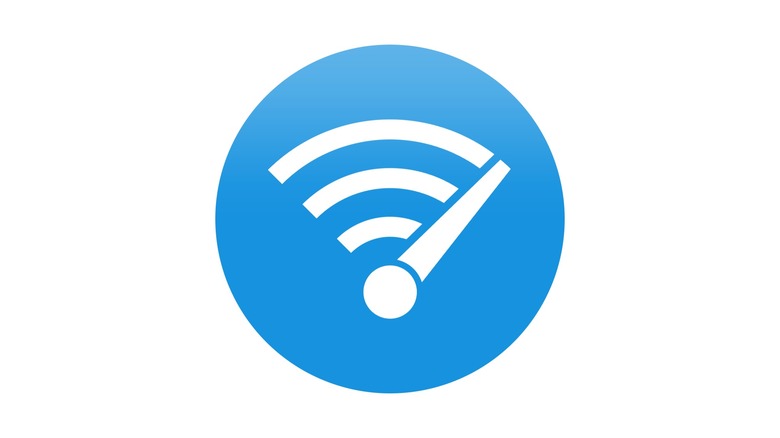5 Of The Most Accurate Ways To Test Your Internet Speed
Internet speed is more important than it's ever been before. Our entertainment is increasingly dominated by massive files, like video games that take up dozens of gigabytes and 4K movies. The expectation of ultra-fast home internet is now so ubiquitous that when Sony released the PlayStation 5 in November 2020, it came in two different models, one of which is entirely dependent on downloading games from the internet. And coming out of the COVID-19 pandemic, our work lives are more remote than ever before, which, in some cases, means cloud collaboration on huge files, like with editing video.
What your ISP advertises as your internet speed and the speed you get in practice aren't always the same, though. This isn't necessarily the ISP's fault, though. If you're using a third-party router, it might not play nice with the ISP's equipment, or be outdated, and the same can go for your computer, phone, game console, etc. So how do you make sure that you're getting what you're paying for? That's where speed test websites and apps come in. Some are better than others, though, so how do you figure out which will yield the most accurate results for you?
Ookla/SpeedTest.net
If there's a name brand in internet speed testing, it's Ookla, the company behind Speedtest.net and the Speedtest app. Whatever name you use for it, it's been offering reliable speed tests for decades. Ookla Speedtest is so trusted that it is often the backbone for various other branded speed tests, too: Note the recognizable Speedtest logo if you visit the Google Fiber speed test page.
Besides its historical reliability and accuracy, Ookla brings a few extra features to the table. Ookla offers standalone apps in part because, as explained on its website, those tend to be more reliable than the web version. This is because the browsers throw a lot of new variables into the mix, such as any extensions you might have installed. Ookla also lets you track your speed test history if you have a user account and, unlike some of its rivals, it lets you choose the test server if you're not happy with the automated pick.
In Ookla's mobile app for iOS and Android, it offers a video-specific speed test. That video test is only available on iOS and Android, but it tests how your phone handles videos of different resolutions to tell you the best quality video that you can stream on your connection.
Verizon Speed Test
This one only applies if you're a Verizon Fios subscriber, but it's unique enough to be deserving of an entry here. Verizon has its own web-based speed test, and where it stands out from the rest of the pack is that it doesn't just measure the download/upload speeds and ping time on the device you run it on. What Verizon's speed test adds is a measurement of the speeds between its test site and your router. This means that you can use Verizon's speed test to help diagnose if just a specific device has below-par throughput or if it's an issue with your home's connection.
Historically, reviews for the Verizon speed test haven't been great, with inaccuracies and inconsistencies often cited as its biggest problems. However, in testing for this article, it registered speeds in the range of other trusted tests, and there appears to be a reason for that. It's not clear when this started, but according to a February 2023 Lifewire article, the Verizon speed test is now built on top of Ookla's Speedtest. Which explains a lot.
Netflix's Fast.com
Another recognizable brand that has its own speed test: Netflix, the proprietor of Fast.com. Netflix has long had an interest in making sure its customers get the best speeds possible for the best quality video, even introducing its own content distribution network, Netflix Open Connect, in 2012. In practice, what this means is that ISPs can opt into having a box that contains close to the entire Netflix catalog kept at its data center — instead of the request traveling further across the internet — to provide optimal Netflix service for its customers.
In continuing with this commitment to providing best-in-class streaming video service, Netflix launched Fast.com in 2016. It was to serve as an offshoot of the ISP speed index that the company started maintaining in 2011, a way of trying to keep ISPs honest in terms of who should take the blame when Netflix's service dips in quality. It has a simple interface, is fast and lightweight, and gives consistently reliable results. Its Netflix-first focus does prioritize download speed over all other data, but clicking "Show more info" will also test your latency and upload speed. There's also a settings button that lets you tweak the duration of the test and the number of parallel connections it uses, as well as a checkbox to "Always show all metrics" and save the configuration for future sessions.
Cloudflare
If you're familiar with the name Cloudflare, it's probably from the error messages you get when some of their clients' websites are down. As with Netflix Open Connect, Cloudflare places copies of its clients' websites at data centers around the world to ensure both fast access and protect them from being overcrowded by distributed denial of service attacks. And like Netflix, Cloudflare has its own web-based speed test.
What makes Cloudflare's speed test stand out is the level of detail provided to the user during and after the test. You can see all of the testing metrics in real time, not just after the test is complete, and it shows more than just the basics. Besides the usual download speed, upload speed, ping/latency time, jitter level, and packet loss percentage, Cloudflare's speed test lets you expand each section of the test to examine it on a much more granular level. You can see how your connection performed at every single pass of the tests for unloaded latency, latency during download, latency during upload, download tests of 100kB, 1MB, 10MB, 25MB, and 100MB, and upload tests of the same file sizes minus 100MB.
Cloudflare's speed test has the traditional Twitter and Facebook buttons, as well, but also adds one more unique feature: You can export the test results as a CSV file that can be imported into any spreadsheet app. So if you really want to geek out about your speed test, Cloudflare has the test for you.
SpeedSmart
It's not always about the bells and whistles. One speed test stands out for its simplicity and being welcoming to less-informed users, and that's SpeedSmart. The test itself shows the basics (download, upload, ping, and jitter) without the extra granularity that Cloudflare provides, and it produces accurate, consistent results, but there's more to it that earned SpeedSmart a spot on this list. When it comes to the user interface and contextualization the information, it's probably the best speed test out there.
When the test is complete, clicking on each metric gives you an explanation of the testing process and/or what each metric means. Most of the other tests may tell you what your connection's jitter is, but how many tell you in the test what jitter itself is in the first place? (In SpeedSmart's words: "Jitter is the variation in response times. A good connection will have a reliable and consistent response time, which is represented as a lower jitter score. Less that 2 ms is perfect.") SpeedSmart also lets you track your test history, not just showing the results of each of your tests to date, but also averaging them out and giving you the option of exporting them as a CSV file.
The SpeedSmart website also has a "metrics" tab so you can see how all of the day's users have averaged out, as well as how different countries compare to each other. All in all, for providing the context around the numbers in an easy-to-digest way, SpeedSmart is the best speed test.





